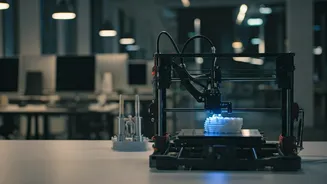The Changing Landscape
The hiring landscape in India is undergoing a significant transformation. Traditional measures, such as solely relying on academic degrees, are gradually
giving way to a more skills-focused approach. Employers now actively seek candidates equipped with practical skills and demonstrable experience, along with a readiness to contribute from their first day on the job. This evolving perspective reflects the recognition that theoretical knowledge alone isn't sufficient for the demands of the modern workplace. It underscores the importance of bridging the gap between education and industry requirements. This also includes adaptability and the capacity for continuous learning, further solidifying the need for a shift in focus from purely academic qualifications to a skill-oriented approach for better employability.
Why the Shift?
Several factors contribute to this shift in hiring practices. Rapid technological advancements across various sectors necessitate that employees possess up-to-date and relevant skills. There is a growing demand for individuals who can immediately apply their knowledge and contribute to company goals. The increasing complexity of job roles also requires a more practical skill set that academic institutions may not always provide. Employers are increasingly looking for candidates who can solve real-world problems and adapt to changes within the industry. This is also driven by a desire to boost productivity and decrease training time, pushing the emphasis on candidates with a solid foundation in both the practical and technical aspects of their field. The demand for employees who are 'day-one ready' is a direct result of these needs.
Industry Steps In
To address the need for a skilled workforce, industry leaders have taken steps to bridge the employability gap. Many companies have started to collaborate with educational institutions, providing training and apprenticeship programs to equip students with the necessary skills. These programs often include internships, workshops, and mentorship initiatives. The goal is to provide students with hands-on experience and expose them to industry best practices. Such efforts give students practical exposure and better equip them for challenges in the professional world. Industry involvement helps align curricula with the current requirements of the market. This also ensures that graduates are well-prepared to meet the expectations of potential employers and contribute effectively from the start of their careers.
Apprenticeships are Essential
Apprenticeships are transitioning from optional to essential in the current climate. They offer valuable practical experience and a chance for students to gain hands-on skills in a real-world environment. Apprenticeships allow individuals to apply the knowledge learned in the classroom to practical situations, thus solidifying their understanding of specific job roles. They provide opportunities to develop important skills like teamwork, problem-solving, and communication. This can boost confidence and make students more employable after graduation. They are also a crucial channel for students to explore their desired career paths, allowing them to gain relevant experience and make an informed decision on their professional journey. The shift is reflective of the recognition that such practical training is an important part of career readiness.
Students Must Adapt
Students now need to adapt to the changing landscape to increase their chances of employment. Focusing solely on academics is no longer enough. The emphasis is on developing a well-rounded skill set that includes technical, soft skills, and practical experience. Students should seek opportunities for internships, apprenticeships, and hands-on projects to gain practical experience. Pursuing industry-relevant certifications and upskilling in areas like data analytics, digital marketing, or cloud computing can also give them a competitive edge. Students are expected to demonstrate critical thinking skills, adaptability, and a proactive approach to learning. This includes a commitment to continuous learning and the ability to apply their knowledge to solve real-world problems. By adopting this approach, students can better position themselves to meet the evolving demands of the job market.



















